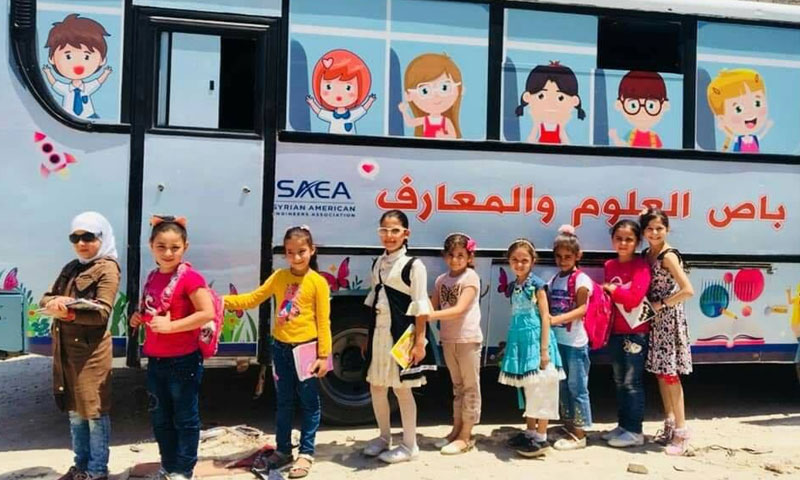Equipped with all that is needed to provide a “successful” educational experience, a bus sets out on an errand, searching for a specific class of camp children, to whom it offers both scientific and entertainment programs, aiming to erase the stereotypical image of education stuck to the minds of students, the managers explain their project’s idea.
On July 24, 2019, Qeeam/Values Foundation launched an educational project, sending a bus on the roads to attract the children of al-Bab city, eastern rural Aleppo, with all the tools required for the educational task, said Iman Mohammad, director of Qeeam Foundation.
In an interview with Enab Baladi, Mohammad said that the Knowledge and Science Bus project targets most vulnerable children in al-Bab city and children in neighboring camps, who are in reach.
Students from the Model al-Qalam Schools/Pen, she said, can also benefit from the bus-based project, where they are offered interactive classes within a distinctive educational environment.
The project aims to offer education to the neediest of children, as it targets camp-based girls, to whom illiteracy eradication classes are dedicated, in addition to various awareness-related ones, Mohammad added.
Under the project’s programs, children are offered training on computer skills, watch purposeful movies, attend a book reading and discussion sessions and others involving interactive stories and a puppet show that seek to develop the process of thinking and build conscious personalities, according to the Director of Qeeam Foundation Iman Mohammad.
“[Such projects] develop students’ thinking and training skills, for they are based on conversation, interaction, discussion and the ability at asking questions,” Mohammad said.
The Knowledge and Science Bus is supplemented with educational and technical tools, including a projector, computers, printer, mobile library and a whiteboard.
Of the quality classes provided by the bus are laboratory sciences and physics experiments, during which students are offered the application of science, chemistry and physics theoretical classes, said Mayss, a female student benefiting from the bus’s services.
Mayss, a 10-year-old girl, told Enab Baladi that her favorite course is laboratory science, adding that she and her colleagues have once performed an autopsy on a human kidney
“We read and discussed books during the speed-reading classes; the reception of information felt both fast and easy.”
Umm Mohammad, a woman displaced from Homs city and based in al-Bab city, told Enab Baladi that she enrolled all her children in the program, for she believes that it delivers information in a developed technical manner that encourages students to learn and help them to comprehend and keep information in mind for a long time.
Children based in Northern Syria’s camps are faced with various difficulties in getting basic education, amidst modest local efforts that seek to control dropout rates.
In the report it published on Syrian children in April, the International Red Cross (IRC) pointed out that two million Syrian children are yet denied access to school due to war-related conditions and ceaseless waves of displacement.

